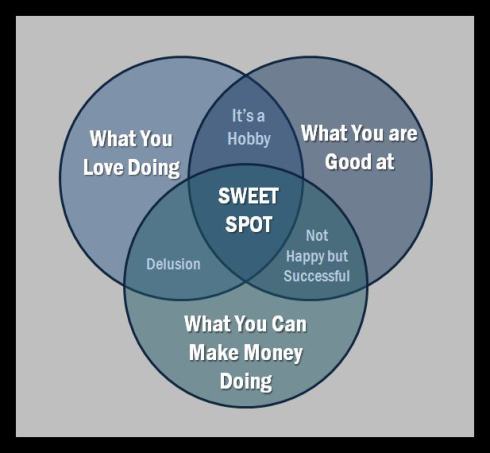 Mentoring others gives me deep satisfaction. One of the most common mentoring topics is the question of how to be successful: how to orient one’s career, what is the right job to take, what to do with your professional life.
Mentoring others gives me deep satisfaction. One of the most common mentoring topics is the question of how to be successful: how to orient one’s career, what is the right job to take, what to do with your professional life.
The Secrets to Success According to Richard St. John’s
One of the top Ted talks (4.6 million views as of today), Richard St Johns talks about the 8 secrets of success, which he developed after 500 interviews of highly successful people. I have to completely agree with these 8 “secrets”.
The second, third and fourth are hard work, focus and practicing until you get good. Simple words, sure – yet working hard, being focused and practicing are difficult to do on a daily basis. Focus is tricky, because there are always distractions and other interests that pull you aside from the road. This is why focus is best defined in terms of what you will not do anymore.
Focusing tirelessly, practicing every day and working hard should drive your life. Many consume more than one self-help books and try to build the discipline to get them done. But they come naturally, almost effortlessly, if you have the first one of Richard St. John’s secrets: Passion. You will need to watch the Ted talk for the other four. (it’s worth it, it is only three minutes).
Developing Passion
You can’t just decide to get passionate about something. Passion is not commanded intellectually. Passion comes from the heart.
Or maybe passion comes from DNA: Marcus Buckingham leads a philosophy that suggests every one of us is ‘strong’ in certain areas or activities that we enjoy: activities that give us satisfaction and make us feel better when we perform tem. His philosophy is that the people that pursue their strengths are happier and that companies that focus on aligning their people with the activities that leverage their strengths are most successful.
What are you Passionate about?
Because you can’t decide to become passionate about something , you must find what you are passionate about and then focus your work on that.
One of the things I am most grateful to my dad is that he exposed me to many things allowing me to discover my passions. He made it possible for me to try many things that I did not like – or that I liked but was not good at, like musical instruments. One day, when I was in middle school, my dad showed up with a book ‘Positioning. The Battle for your Mind’ . I devoured the book. Right then I knew I wanted to be a marketer. That’s my calling. What’s yours?
My point is that you can’t find your passion unless you spend some time exploring. A few months ago I blogged about my story of passion for Coffee and how knowledge is a requirement for love . You can’t love what you don’[t know. I probably would not be a marketer today if my dad had not exposed me to that book.
Be The Best You Can
You should aspire to be the best you can in whatever area you are passionate about. Note that being the best you can is about your performance relative to your potential. It is different to being the best in the world, which measures your ability relative to others (more ego driven). but even while you should measure your success in terms of your own capabilities, it is important to understand your level of ability or competency relative to the rest of the world.
In his book Quitter, Jon Acuff tells a story of when he really wanted to be a copy writer at a large agency. One day, an exec at a prominent agency receives him and gifts him the experience to read all the portfolios that had been submitted for consideration by copy writing candidates. The experience allowed Jon to understand where the bar for good and great was, and in his case, to realize that he was not made to be a copy writer.
Passion Makes You Work Hard and Become Great
When you are truly passionate about something you focus, you aspire to learn and get better every day. You work hard and practice until you become good. You try to be the best.
When Mark Cuban got his first job as a software sales person, he read all the software manuals he could get a hold on. He read a manual every single day after getting home no matter how late, and he enjoyed it. “I could not put them down“. Mark quickly became an expert, and a valuable resource for is clients. He pulled away from the rest of the salespeople in software Dallas and found success. The rest is history.
Just Do it
A few months ago, a friend asked me for career advice. He told me he really wanted to be a writer and he was looking for a break. I asked him to show me examples of his work. He did not have any. If you are passionate about writing, you surely have a blog, or a manuscript for a book in a drawer, or poems in napkins, right? I asked. He did not.
How come? He really wanted to be a writer. But he did not spend time on his passion. Maybe he was afraid of not being good. Maybe he was busy. Maybe he never took the time to think about a path to become a great writer and where to get started. Unfortunately, this is a common scenario.
You have to follow your passion. You have to spend the time to explore the world and find what you are passionate about and then you must make time to practice and get better. ‘I don’t have time’ is not an excuse if you spend an hour every day watching TV. Get up 30 minutes earlier. Eliminate distractions. Unsubscribe from 10 email newsletters and a few RSS feeds. Cut back on Facebook. Otherwise, you will be in the same place 10 years from now.
Applying the Hedgehog Strategy to Your Career
In his book, Good to Great, Jim Collins describes a “hedgehog strategy” for organizations that can be very slightly modified to become a very simple but powerful tool for career planning. The concept is based on a VIN diagram with three intersecting circles:
- One circle defines what you can be really good at. Your strengths and natural skills.
- One circle defines the activities that you enjoy doing, your passions.
- One circle defines the activities that fulfill your financial needs. Where you can make enough money.
The area where the circles intersect are the most interesting:
- I enjoy and am good at things like photography that won’t make me enough money to provide for my family, so they are hobbies.
- I am also good at things that I don’t necessarily like, I could perform these activities and even make enough money but I will not be happy and probably won’t be very successful. I am a very good salesman, and I know I could make a ton of money in this career – but I would be miserable because I don’t like working on a quota and probably could not deal with the pressure.
- There are also things that I like, such as playing the piano, but I am not good at and I won’t get good at. I am delusional is I think I will be a professional piano player, I simply don’t have the coordination not I would be able to develop it.
The place where these circles overlap is the ideal spot for your career: an area you are passionate about, you are good at it, and you can make money. Again, it may sound like a simplistic concept, but I have seen it used as a tool by people in all stages of their career to make smart decisions.
”Love. Fall in love and stay in love. Write only what you love, and love what you write. The key word is love. You have to get up in the morning and write something you love, something to live for.” — Ray Bradbury
”You never achieve success unless you like what you are doing.” — Dale Carnegie
